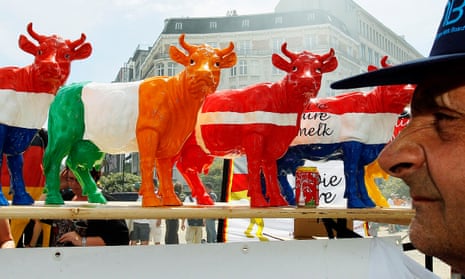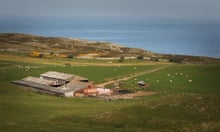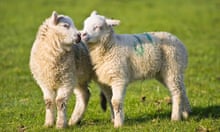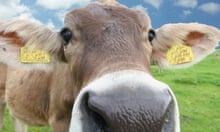The EU is disregarding the climate emergency by continuing to give out billions of euros in subsidies to climate-intensive livestock farms at the same time as promising to cut emissions, say campaigners.
Under the Paris climate agreement, the EU and its member states have committed to reduce emissions in the European Union by at least 40% by 2030. The EU’s farming sector has shown no decline in emissions since 2010, with meat and dairy estimated to be responsible for 12-17% of total greenhouse gas emissions.
Yet the EU continues to pay out an estimated £24bn of taxpayer money – nearly a fifth of the EU’s total budget – to support livestock farms across Europe, the majority of which are climate-intensive.
“Instead of pouring billions of euros into industrial farms that drive climate change, the EU must support farmers to produce less and better meat, and to provide meat and dairy alternatives,” said Greenpeace’s EU agriculture policy director, Marco Contiero.
The EU’s subsidy payouts to farmers are due to be replaced by next year. The EU Commission’s draft Common Agricultural Policy (CAP) reform proposals, published last year, include an objective to take action on climate change. However, they set no targets for reducing livestock numbers. The EU agricultural commissioner, Phil Hogan, has previously been reported as dismissing the sector’s emissions footprint.
Compassion in World Farming campaigner Peter Stevenson said the EU was “deaf to the scientific arguments” that a reduction in EU production and consumption is necessary to tackle climate change.
Former EU Environment commissioner Karl Falkenberg pointed the blame at MEPs in the EU Parliament’s all-powerful agri-committee for blocking reforms. More than half the politicians on the committee have declared interests as farmers, former farmers, CAP payment recipients in another capacity, current or former partners in agricultural businesses, or have spouses who own farms.
“It is mainly made up of farming or rural MEPs who want to be members of the committee because it gives them a way to get re-elected. The entire EU Parliament might not take the same line as the committee, but if we get a bad policy from them it is harder to change,” Falkenberg told the Guardian.
The thinktank Rise Foundation has said Europe’s meat and dairy production would need to halve by 2050 to meet global targets for reducing climate emissions.
MEPs from the European Parliament’s environment committee proposed earlier this year to restrict subsidy payments for livestock farms that don’t cut their stocking density – the number of animals they keep in the space available. Greenpeace says the move would help incentivise farms to turn towards less intensive farming.
The EU Commission has argued that greenhouse gas emissions at global level could increase if EU production was replaced by imports. It has also pointed to research showing that the least intensive farms are more reliant on EU farm subsidies than more intensive ones.
“We should be using the CAP to lower emissions, but there is a danger of scaring off EU production to other countries,” said Allan Buckwell from the Institute for European Environmental Policy, who called for measures, including a meat tax, to tackle meat and dairy consumption as well as production in Europe.
The EU farming lobby group Copa-Cogeca said livestock farmers contributed to preserving grasslands, keeping rural communities strong and helping provide consumers with a balanced diet.
“Many of the studies that call for a reduction of livestock do not consider the actual implications that a shift in production would have. Land would be abandoned and other benefits for the environment would be lost.
“Farmers are already looking into how to reduce emissions from livestock farming and working with research to come up with viable solutions – such as reducing livestock enteric methane emissions through special feed supplements – that do not jeopardise livestock production in the EU and are also sustainable for farmers,” said a spokesperson.
The EU Commission said the next CAP would require member states to show how they will be using it to bolster climate action, including from the livestock sector. It said it was also supporting research into ways of reducing emissions from livestock and promoting alternative protein crops.








